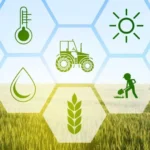More Than 50 % Of Indians Face High Health Risks Due To Climate Change

Using 50 indicators across 640 Indian districts, researchers mapped exposure, sensitivity to the hot weather and adaptive capacities (ACs) to gauge health vulnerability
Although everyone is impacted by climate change, these effects are not all the same. Better off people with access to social safety nets, education, steady jobs, and better living conditions are also better able to adjust and lessen the effects. But for people living on the fringes, with unstable incomes and little access to healthcare, the risks are greatly increased.
The vulnerability of India’s health to climate change is a serious problem. The harsh reality of extended summers, unpredictable rainfall, floods, droughts, and rising sea levels exacerbate the frequency and severity of illnesses, drive people into poverty, and cause migration.
The dire future that Indians face is revealed by a groundbreaking study that was published in Climatic Change. Researchers thoroughly mapped exposure, sensitivity to hot weather and adaptive capabilities (ACs) to determine health vulnerability by evaluating 50 indicators across 640 Indian districts. The findings are stark:
- 298 districts, housing 52 per cent of the population, face high or very high exposure.
- 184 districts, home to 30 per cent of the people, are highly or very sensitive.
- 153 districts, where 20 per cent of the population lives, have moderate or low ACs.
The study also finds that there are 38 districts that are extremely vulnerable, 306 that are more vulnerable, 278 that are moderately vulnerable and 18 that are lowly vulnerable. The states with the most districts at risk are Madhya Pradesh (3), Rajasthan (15), and Uttar Pradesh (37).
India’s climatic catastrophe necessitates a fundamental change in perspective on development. Millions of people facing enormous health hazards cannot be protected by traditional models. This study is a crucial first step in understanding and resolving India’s complex health and climate change concerns. It also acts as a wake-up call.
The researchers propose multi-sectoral policy responses to tackle the root causes of vulnerability:
- Investing in Health:Public health spending growth has the potential to dramatically lower out-of-pocket costs and improve access to primary healthcare, particularly in high-risk areas where child health and infant mortality are high.
- Addressing Social Determinants of Health:Reducing sensitivity and increasing adaptive ability can be achieved through providing sustainable livelihoods, bettering working conditions, growing social safety nets, and boosting education.
- Strengthening Data Systems:Resilient and adaptable data platforms are essential for efficient policymaking. It is imperative that the healthcare system collaborate, share data more effectively and foster trust.
- Empowering Local Communities:Involving institutions of local self-governance in the climate and health agenda is crucial for effective adaptation and mitigation strategies.
- Holding the System Accountable:Increased health system accountability to the people is vital for ensuring equitable access to quality healthcare.
(Inputs from Planet Outlook)






















































































































































































































































































































































































































































































































































































































































































































































































































































